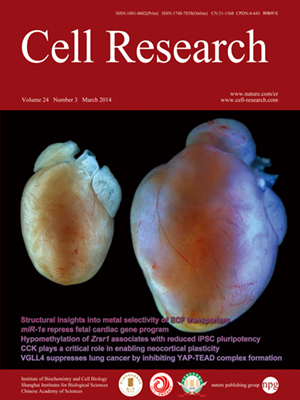
Volume 24, No 3, Mar 2014
ISSN: 1001-0602
EISSN: 1748-7838 2018
impact factor 17.848*
(Clarivate Analytics, 2019)
Volume 24 Issue 3, March 2014: 376-379
LETTERS TO THE EDITOR
The ubiquitin conjugating enzyme UBE2L3 regulates TNFα-induced linear ubiquitination
Bishi Fu1,*, Shitao Li1,*, Lingyan Wang1, Michael A Berman1 and Martin E Dorf1
1Division of Immunology, Department of Microbiology and Immunobiology, Harvard Medical School, Boston, MA 02115, USA
Correspondence: Martin E Dorf(dorf@hms.harvard.edu)
The inducible and reversible modification of proteins with polyubiquitin chains has emerged as one of the most common and versatile means of protein modification. Ubiquitin contains 7 lysine residues, each of which can serve as an acceptor site for formation of polyubiquitin chains. In addition, the C-terminal glycine of one ubiquitin molecule can form a conventional peptide bond with the N-terminal methionine of an acceptor ubiquitin, leading to the formation of linear polyubiquitin chains. Linear ubiquitin chains stabilize proteins and play critical roles in signaling complex assembly. The linear ubiquitin chain assembly complex (LUBAC) consists of at least 3 proteins: HOIP (also known as RNF31), HOIL-1L (also known as RBCK1), and SHARPIN [1-6].
10.1038/cr.2013.133
FULL TEXT | PDF
Browse 2225


